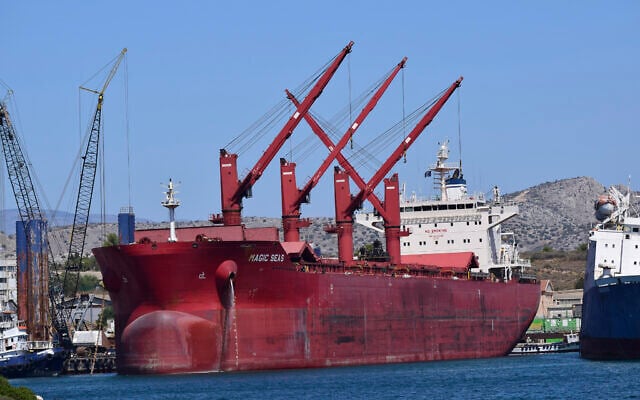



Two crew members of the Liberian-flagged, Greek-owned bulk carrier ship Eternity C were killed in an attack by sea drones and speedboats off Yemen on Monday night, Liberia’s delegation told a meeting of the UN’s International Maritime Organization the following day.
Yemen’s Houthi rebels carried on an hours-long attack Tuesday targeting the cargo ship in the Red Sea, authorities said, after the group claimed to have sunk another vessel in an assault that threatened to renew combat across the vital waterway.
The Eternity C remains “surrounded by small craft and is under continuous attack,” the United Kingdom Maritime Trade Operations Center warned Tuesday. Earlier, at least two people on board the ship were reported to be hurt, and two others were reported missing.
All but one of the 22 crew stranded aboard the Eternity are from the Philippines, officials in Manila said.
The deaths, the first since June 2024, brought the total number of seafarers killed in attacks on vessels in the Red Sea to six.
The bulk carrier had been heading north toward the Suez Canal when it came under fire by men in small boats and by bomb-carrying drones Monday night. The security guards on board also fired their weapons. The European Union anti-piracy force known as Operation Atalanta and the private security firm Ambrey both reported those details.
While the Iran-backed Houthis haven’t claimed the attack, Yemen’s exiled government and the EU force blamed the rebels.
The Houthis had already attacked the Liberian-flagged, Greek-owned bulk carrier Magic Seas on Sunday with drones, missiles, rocket-propelled grenades, and small arms fire, forcing its crew of 22 to abandon the vessel. The rebels later said the ship sank in the Red Sea.
The two attacks, along with a round of Israeli airstrikes early Monday targeting the rebels in response to their ballistic missile fire at Israel, raised fears of a renewed Houthi campaign against shipping that could again draw in US and Western forces, particularly after US President Donald Trump’s administration reached an agreement with the rebels in May.
The attacks come at a sensitive moment in the Middle East, as a possible ceasefire in the Israel-Hamas war hangs in the balance, and as Iran weighs whether to restart negotiations over its nuclear program following American airstrikes targeting its most sensitive atomic sites during the Israel-Iran war in June.
The Houthis — whose slogan calls for “Death to America, Death to Israel, [and] a Curse on the Jews” — began attacking Israel and maritime traffic in November 2023, a month after the October 7 Hamas massacre that triggered the war in the Gaza Strip.
The Houthis held their fire when a ceasefire was reached between Israel and Hamas in January 2025. By that point, they had fired over 40 ballistic missiles and dozens of attack drones and cruise missiles at Israel, including one that killed a civilian and wounded several others in Tel Aviv in July 2024, prompting Israel’s first strike in Yemen.
Since March 18, 2025, when the IDF resumed its offensive against Hamas in the Gaza Strip, the Houthis have launched 58 ballistic missiles and at least 13 drones at Israel. Several of the missiles have fallen short and almost all of the others have been intercepted.
Shipping through the Red Sea, while still lower than normal, has increased in recent weeks.
The group, which had said it was acting in solidarity with Palestinians, stopped firing at US ships under a May 2025 agreement, though it has continued to attack Israel directly with missiles. Houthis had not attacked a vessel until this weekend.
Between November 2023 and January 2025, the Houthis targeted more than 100 merchant vessels with missiles and drones, sinking two of them and killing four sailors. Their campaign has greatly reduced the flow of trade through the Red Sea corridor, which typically sees $1 trillion of goods move through it annually. Shipping through the Red Sea, while still lower than normal, has increased in recent weeks.


